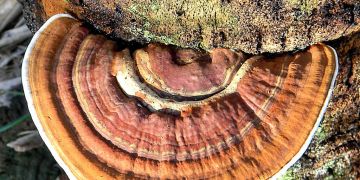Cultivation
All mushrooms are the “fruit” of fungi as well as the reproductive part. Ganoderma can be found growing up from underground networks called mycelium near organic waste and logs, which are both a good nutrient source. Given the right conditions, ganoderma can actually be cultivated and used in medicine.
The Eastern world has been using ganoderma for thousands of years, particularly in China and Japan. Even the ancient kings and emperors drank reishi tea because it was believed that its properties encouraged vigor and long life. They also thought that the tea would increase their wisdom and happiness.
The use of reishi has reached the Western world where these days people are making elixirs from the mushroom for the purpose of promoting vitality and longevity. It is also used to treat certain medical conditions.
Benefits of Ganoderma and Supplements
The benefits of ganoderma are so well known and proven that you can get them in forms that are much convenient that slicing them up and cooking with them. You can buy them dried, in concentrated tablets, capsules, or even as an extract. In any of these forms ganoderma can be used as a dietary supplement.
Here is a list of the benefits that Ganoderma have as a daily dietary supplement or in helping to treat certain medical conditions:
Antioxidant properties
These mushrooms are very strong antioxidants protect the body from the negative effects of free radicals that are formed inside the body by daily exposure to the sun, chemicals, and pollutants. Ganoderma are proven to boost the immune system, especially when taken with other antioxidant supplements.
Potential to prevent cancer
It is believed that Ganoderma can suppress the growth of tumors in people with cancer. It can reinforce the membranes in cancerous cells to keep the tumor from spreading. For this reason, they are often used in efforts to prevent cancers.
Relieves respiratory conditions
Ganoderma are also beneficial for people suffering from asthma and other respiratory conditions because it seems to have a healing effect on the lungs. They are good for building respiratory strength and curbing a cough.
Anti-inflammatory
Ganoderma have anti-inflammatory properties and are therefore used sometimes for patients who have Alzheimer’s and heart disease. This is based on the idea that inflammation plays a part in each of these conditions. The pain that accompanies other inflammatory conditions like neuralgia and arthritis may also be lessened by ganoderma supplements.
Lowers cholesterol
As far as benefits for the heart, ganoderma can improve the flow of blood to the heart and reduce the amount of oxygen the heart consumes. It can help to lower cholesterol and some of the ingredients may help combat high blood pressure.
Ingredients in Ganoderma
So exactly what is in ganoderma that give it so many health benefits? Scientists have learned one active ingredient is polysaccharides, which contain beta glucan. Beta glucan is known for its ability to enhance the immune system – in fact it is one of the strongest immune system supplements there is.
Another ingredient in ganoderma is triterpenes. The type found in ganoderma is a ganoderic acid that has been proven in studies to ease the symptoms of allergies by stopping the release of histamines. It also can improve the body’s use of oxygen and help the liver function better.
How Much Ganoderma to Take When Using As A Supplement
The recommended dose when using ganoderma as a dietary supplement is 150 to 900 mg if taken in tablet or capsule form or 1.5 to 9 grams of the dried variety. There have rarely been any side effects reported from ganoderma, but some people who take them for a period of several months may experience dry mouth, dizziness, stomach discomfort, or nosebleeds.





